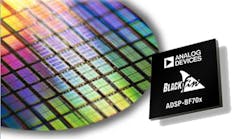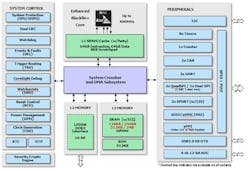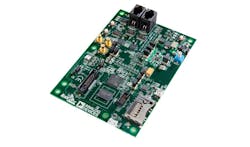Low Power DSPs Target Audio, Imaging And Automation Applications
Analog Devices has added the ADSP-BF70x to the Blackfin processor family (Fig. 1). The new offerings incorporate the new Blackfin+ core. It can handle 2 by 16-bit, 32-bit and complex math operations in a single cycle. It is backwards compatible and delivers 800 MMACS for 16-bit operations and half that for 32-bit operations. Versions are available with up to 1 Mbyte of SRAM with ECC support that can also be uses as an L2 cache. The L1 cache is 132 Kbytes. The 16-bit DDR2 and LPDDR support is optional. The system can run using only on-chip SRAM if off-chip memory is not required.
The chips target a wide range of applications from mobile and automotive audio processing to imaging applications. They also address many industrial automation application areas.
The new chips can use as little as 95 mW of power when running at 400 MHz. Interfaces include ePPI, I2C, 4-bit SD/SDIO/MMC, two SPORTs, two UARTs, and two CAN 2.0B. The three SPI interfaces handle dual and quad SPI. There is also a host USB 2.0 OTG port. Also part of the mix is the security accelerator. This also includes one-time programming (OTP) support.
Analog Devices have a number of different evaluation and development platforms like the ADZS-BF707-EZLITE (Fig. 2). It includes the $150 ICE-1000 JTAG controller. The systems also work with the higher performance ICE-2000.
The chips are supported by Analog Devices’ Eclipse-based CrossCore Embedded Studio 1.1.0. It has seamless integration with RTOS, middleware and protocols stacks such as Micrium µC/OS-III. Analog Devices also provides a wide range of royalty free software such as its Image Processing Toolbox and audio decoders. The Blackfin family enjoys a wide range of compatible third party products including The Mathworks MATLAB and Simulink.
Pricing for the ADSP-BF70x starts at $3.99. The chips without the DRAM controller come in a 12 mm by 12 mm, 88 lead QFN package. The versions with the controller are the same size but in a 184-ball BGA. These chips also have an 8-bit eMMC interface as well as a 4-channel, 12-bit ADC.



